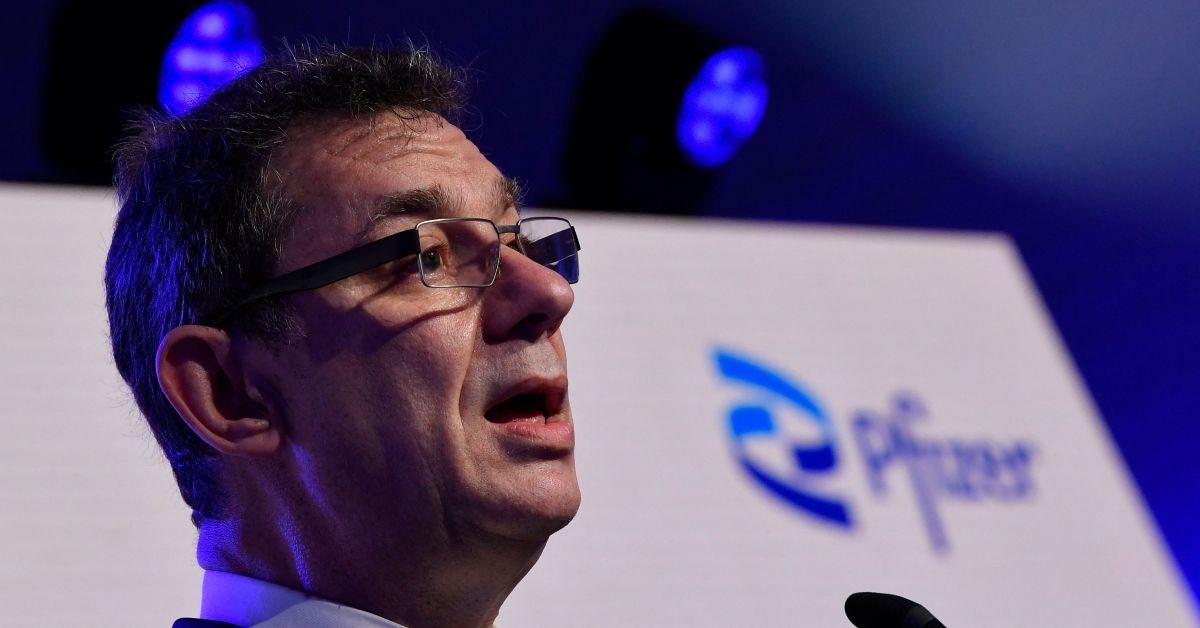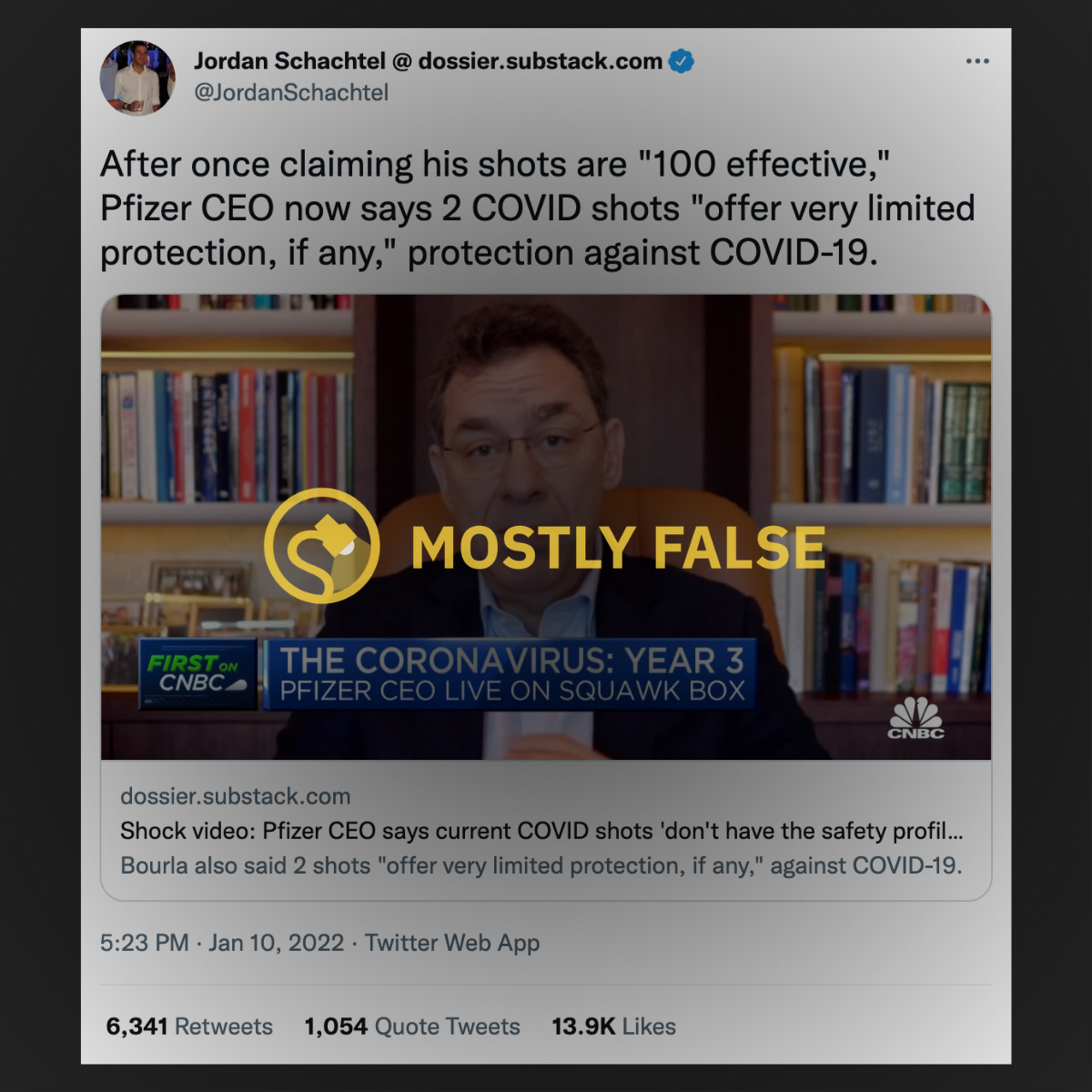In an interview on Jan. 10, 2022, Bourla said the existing two-dose Pfizer/BioNTech vaccine offered "very limited protection, if any." However...
Bourla was referring specifically to infection from the omicron variant of COVID-19, not COVID-19 in general.
In January 2022, as the world entered the third year of the COVID-19 pandemic, social media users and commentators — principally vaccine skeptics and COVID-19 conspiracy theorists — responded with outrage to remarks made during an interview by Pfizer CEO Albert Bourla, who has been a frequent target of disinformation throughout the pandemic.
On Twitter, commentator Jordan Schachtel wrote "Pfizer CEO now says 2 COVID shots 'offer very limited protection, if any,' protection against COVID-19":
Without providing any context, several others posted short clips from the interview or quoted Bourla as saying: "We know that the two doses of the vaccine offer very limited protection, if any."
In reality, Bourla did not say his company's two-dose vaccine offered limited or no protection against COVID-19. Rather, he was speaking quite specifically about the omicron variant of the virus — a significantly and substantively different proposition, especially given that the variant emerged after the development and distribution of the original vaccine. We are issuing a rating of "Mostly False."
What Did Pfizer's CEO Actually Say About the COVID-19 Vaccine's Effectiveness?
Bourla made his remarks during a Jan. 10 interview with Anjalee Khemlani, for Yahoo! Finance. The two were discussing the impact of the omicron variant and, when viewed in their proper context, it's quite clear that Bourla's comments related specifically to that subject, and that he was not articulating a more general assessment of the efficacy of the Pfizer/BioNTech vaccine.
In the interests of presenting Bourla's remarks in their proper context, the exchange can be watched in full further below, and an excerpted transcript follows. A quick note of context: Bourla is a naturalized U.S. citizen, born in Greece, for whom English is a second language. His speech patterns occasionally reflect that non-native proficiency and we have lightly edited his remarks for clarity.
Khemlani: We know that here in the U.S.,...we've had discussions about boosters coming this fall, and we're watching the Omicron wave really surge in certain parts of the country as well as the world. Tell me what you're seeing in terms of the potential for possibly changing how we look at boosters and what kinds of boosters you anticipate — I know you're working on an Omicron-specific booster as well, right now. So what's at stake for us in the Fall of '22?
Bourla: Clearly the situation has...deteriorated because of the Omicron [variant]. We had a very quick [inaudible]. It is a disease that manifests a little bit less in terms of mildness — I mean it's more mild, but you know, because of the...high [infection] rates, still the [hospitalizations] and absolute numbers are going much higher in terms of severe disease, ICU [intensive care unit] occupation, etc...
And we know that the...two [doses] of the vaccine offer very limited protection, if any. The three doses — with a booster — they offer reasonable protection against hospitalization and deaths. Against deaths, I think [the three doses are] very good, and [they provide] less protection against infection. Now, we are working on a new version of our vaccine...that will cover Omicron as well. And of course we're waiting to [get] the final results, [but] the vaccine will be ready in March, and the vaccine, we'll be able to produce it [on a massive scale].
https://www.youtube.com/watch?v=lhMbKyDq9_w
Viewed in proper context then, it's clear that Bourla was saying that the existing two-dose Pfizer/BioNTech vaccine was comparatively ineffective in combatting the spread of the omicron variant, specifically, but that receiving a third, "booster" dose could make a difference.
In making that point, he was effectively restating the findings of recent high-profile scientific research. For example, in a December 2021 article published in the journal Cell, researchers found that "Two doses of mRNA-based vaccines [such as that produced by Pfizer/BioNTech] elicit poor neutralization of Omicron," but that "Three mRNA vaccine doses elicit potent variant cross-neutralization, including Omicron."
Bourla's assessment ought not to have provoked any controversy, and was supported by recent, peer-reviewed scientific research. However, for those with pre-existing assumptions about Bourla's motivations and incentives, or a broader belief that the COVID-19 pandemic has been engineered and manufactured to empower tyrannical governments and enrich pharmaceutical executives, his remarks appeared to be an admission of guilt. In reality, they were nothing of the sort.
However, even if we set aside those more fundamental "framing" errors, the claim was inaccurate even on its own terms. Bourla wasn't saying his vaccine couldn't fight off COVID-19 in general, and those who claimed as much were grossly misrepresenting what he said, the meaning of which is made entirely clear when viewed in its proper context.
Curious about how Snopes' writers verify information and craft their stories for public consumption? We've collected some posts that help explain how we do what we do. Happy reading and let us know what else you might be interested in knowing.


